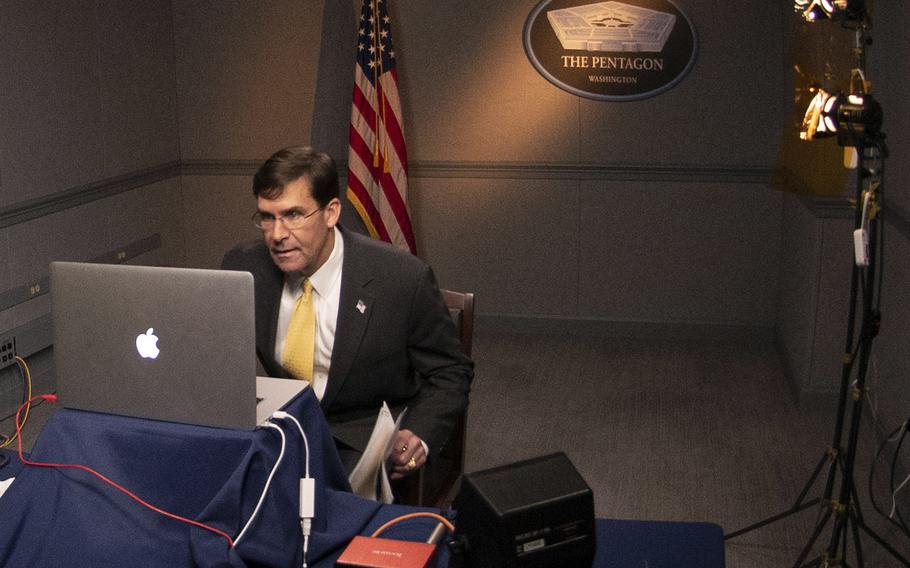
Secretary of Defense Mark T. Esper, participates in a Brookings Institute webinar on May 4, 2020 (Marvin Lynchard/DOD)
Stars and Stripes is making stories on the coronavirus pandemic available free of charge. See other free reports here. Sign up for our daily coronavirus newsletter here. Please support our journalism with a subscription.
WASHINGTON — The military could see greater impacts to readiness over time if they do not adapt their training and recruitment to cope with the coronavirus, Defense Secretary Mark Esper said Monday.
The Defense Department’s “new normal” is learning how it can meet its training and readiness needs during the next year or so until there is a vaccine for the coronavirus, Esper said during an online discussion with the liberal-leaning Brookings Institution about the impacts of the pandemic on the military.
“And that means, the sooner we can adapt our practices, as soon as we can learn from this virus and make changes, the better we will be and the more likely you are to maintain a high degree of readiness for the force. And we're looking at all those things right now,” he said.
As of Monday, the military has had 4,912 cases of the coronavirus, 99 have been hospitalized, 1,806 have recovered from the virus, and two service members have died, according to the Pentagon.
The low numbers are a testament to the force, not just because they are young and healthy but because they have followed Defense Department guidance since January that has left them in “pretty good shape,” Esper said.
The defense secretary said he is more concerned with the potential long-term impacts from the adjustments to recruiting and basic training due to the pandemic.
Basic training bases have had to adjust how they receive recruits to prevent the spread of the virus among personnel, and it has affected how fast they can move people through the process. The Army, Navy, and Marine Corps have delayed recruits from arriving to basic training in order to work out improved processes for future recruits.
“For the most part, we've seen over the past six, seven weeks, a reduced throughput. And that will probably be something that bears itself out in the long run. So we're paying very careful attention to that,” he said.
Esper said he has not wanted to “shut off the pipeline” of recruits coming to basic training because it could impact the military for months if not years. The services are now testing and quarantining recruits before they begin training, he said.
The pause to adjust basic training processing has also prepared the services to take in the large influx of new recruits that follow high school graduations in May and June, Esper said.
Training has not stopped but large-scale exercises have had to be adjusted due to the number of personnel involved and infection concerns, according to Esper. The services have suspended or canceled combat training exercises and joint exercises such as at the Joint Readiness Training Center at Fort Polk, La., or Red Flag at Nellis Air Force Base in Nevada due to the virus, he said.
The concern now is the possible cumulative impact from these lost training opportunities, Esper said.
“At this point in time we're seeing low impact, but over time it could accumulate, particularly as we look at how we train with our friends and allies. And so that's one of the concerns that we that we look at,” he said.
Kenney.Caitlin@stripes.com Twitter: @caitlinmkenney